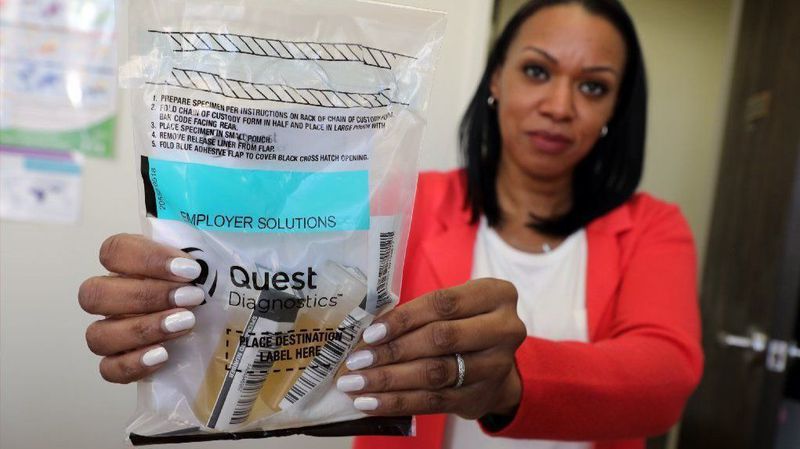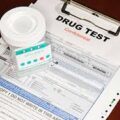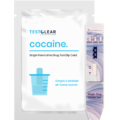Period, also known as menstruation is a release of blood from a girl’s/woman’s uterus, out through her vagina. When you menstruate, your body discards the monthly buildup of the lining of your uterus (womb). Menstrual blood and tissue flow from your uterus through the small opening in your cervix and pass out of your body through your vagina.
During the monthly menstrual cycle, the uterus lining builds up to prepare for pregnancy. If you do not get pregnant, estrogen and progesterone hormone levels begin falling. Very low levels of estrogen and progesterone tell your body to begin menstruation.
What is a Drug Test?
A drug test is a painless test. It analyzes your sample for the presence of certain illegal drugs and prescription medications. A drug test can help a doctor detect potential substance abuse problems. After a drug test identifies drugs you may be misusing, doctors can help you start a treatment plan.
Taking drug tests throughout substance abuse treatment helps to ensure that the plan is working and that you’re no longer taking drugs. The types of tests include:
Urine Screens: The Most Common Type of Drug Tests
Eight in ten companies — about 90% of employers require pre-employment drug screens and most rely on urine tests taken on site, at a lab. Urine screens are also used by detox facilities to ensure patients are staying off drugs. A typical urine drug test panel looks for evidence of cocaine, marijuana, amphetamine, opiates, and alcohol. Some will also look for nicotine.
Saliva-Based Drug Test
Saliva testing looks for recent drug use and provides quick results. The test uses a mouth swab to collect saliva or requires the test subject to spit into a cup. It reveals alcohol, marijuana, cocaine, amphetamine, and methamphetamine use within the past few days, except for marijuana, which the test detects only for 10 hours after use.
Blood Test: The Drug Screen Gold Standard
Of all the drug testing methods, blood tests are the most accurate. They are also the only ones that are invasive and must be performed by trained phlebotomists and analyzed in a lab. Blood tests can detect alcohol use up to 24 hours after drinking. The test panels can also detect cocaine, marijuana, amphetamine, opiates, methamphetamines, and nicotine. Blood tests detect THC, the active ingredient in marijuana, weeks after use.
Hair Follicle Drug Test
Hair testing is noninvasive and easy to obtain. The downside is that it does not show evidence of recent drug use, but rather a historic drug use, up to 90 days ago to the most recent four or five. It tests for cocaine, marijuana, opiates, methamphetamine, and phencyclidine (PCP). This test also takes longer to complete than other drug testing methods, particularly for subjects with long hair. At least 1.5” of hair is needed for testing. Every half-inch of hair reveals drug use within the last month. Only the newest hair is used.
Perspiration Drug Detection Test
Perspiration is a new type of drug testing primarily used to monitor people in recovery or on probation/parole. This method screens for drugs through a patch applied to the subject’s skin and left on for 14 days. The patch collects perspiration and analyzes it for marijuana, cocaine, methamphetamines, LSD, and heroin.
Breathalyzer Testing
Breathalyzer testing for alcohol use is growing in popularity in the home market. New tests include smartphone apps for self-testing. Police use breathalyzers to provide on-the-spot testing for DUI. A suspect is asked to blow into a sterile tube attached to the breathalyzer detection device.
Can You Take A Drug Test While On Your Period?
Yes, but studies recommend that urine tests should be avoided during menstruation because blood contamination can easily occur. The first or second-morning urine specimen is recommended. Menstruation should not affect the results of most drug tests, as the tests are designed to detect the presence of drugs or their metabolites in your urine, blood, or saliva, not hormones or other substances related to your menstrual cycle.
However, if you are taking any medications or supplements to manage menstrual symptoms, it is possible that these could potentially interfere with the drug test results. For example, some pain relievers and anti-inflammatory drugs may produce false-positive results for certain drugs, such as marijuana.
If you are concerned about the possibility of any medications or supplements affecting the results of a drug test, you should discuss this with the healthcare provider or testing facility conducting the test beforehand. They may be able to advise you on any precautions you need to take to ensure accurate results.
In the alternative, you can opt for other drug testing methods. For example, you can ask for a saliva test, blood test, hair test, or other biological sample collection that can aid in detecting traces of drugs apart from urine. This way, you will be able to go for the drug test and avoid the discomfort of presenting a urine sample contaminated with a menstrual flow which might alter the test results or cause false positives. Read: List Of Companies That Don’t Test For Drugs





